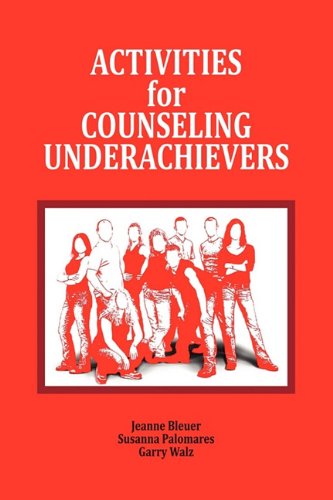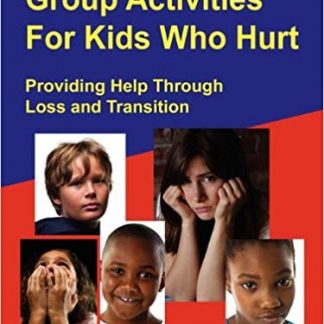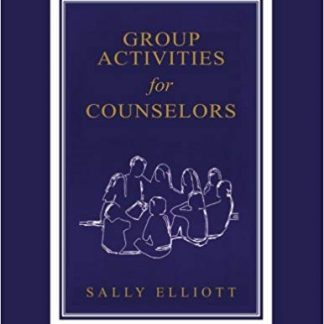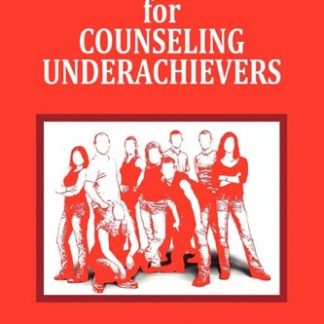Activities for Counseling Underachievers
$19.95
Jeanne C. Bleuer, Susanna Palomares & Garry Walz
Conventional wisdom has it that the way to achieve more is to study harder—put in longer hours and avoid the distraction of other people. Research suggests something different—study smarter, not necessarily harder, and use others as a support group. This book provides all the tools you’ll need to help students improve both their perceptions of themselves as achievers and their ability to apply effective learning strategies. Because everything is reproducible, just one book allows you to work with any number of students.
Students determine what’s right about their achievement and where they can make improvements by completing and scoring the . They check their interpretative and prescriptive skills against
26 critical achievement factors and also by discussing and problem solving using relevant Simulated Case Histories. They further enhance their abilities and motivation to achieve by participating in Individual and Group activities.
For your effective and easy use this book includes the following, all of which are reproducible:
- Achievement Potential Survey student questionnaire
- Achievement Potential Survey summary answer sheet
- Directions for scoring the Achievement Potential Survey
- Directions for analyzing and interpreting the Achievement Potential Survey
- Guidelines for Developing a Student Action Plan
- Achievement Potential Follow-Up Survey and Summary Sheet
- Simulated Problem-Solving Case Histories for student discussion and reflection
- Over 20 Group Activities teaching such important factors as:
- Building positive support groups
- Understanding rules
- Strategies for reducing anger
- Attentive listening
- Problem-solving and decision making
- Planning and goal attainment
- Improving study habits
- Time management
- Positive self talk
Table of Contents
Introduction
How to Use This Book
Achievement Potential Survey
Achievement Potential Summary Sheet
Scoring and Interpreting Your
Achievement Potential
Analyzing and Interpreting Your
Achievement potential Sheet
What Would You Do?
—Simulated Problem Case Histories for Student Discussion
Student Activities
Achievement Potential Follow-up
Survey Summary Sheet
Achievement Potential Survey
The key to the successful use of this book is the reproducible Achievement Potential Survey, a self-evaluation instrument for helping students understand what is right about their achievement level, where they can make improvements, and what, specifically, they can do to make those improvements. With this single book you can work with as many students as you wish.
The Achievement Potential Survey is designed to allow students to evaluate themselves through 26 critical achievement factors. After taking the survey, guidelines are provided for determining which factors are assets (achievement strengths), which are barriers (obstacles to learning), and which are concerns (an area that can become either an asset or a barrier).
Through reflection, discussion, and coaching students learn what can be done to capitalize on both internal and external assets. What they can do to reduce the impact of external barriers, and what they can do to greatly increase the odds of concerns becoming assets instead of barriers.
Activities for Counseling Underachievers provides guidelines for developing an action plan based on each student’s individual survey. Also included are case histories for discussion, reflection, and problem solving, and group activities that develop awareness and competencies in those factors measured in the Achievement Potential Survey.
The 26 Achievement Factors measured in the
Achievement Potential Survey:
Part 1 deals with how confident students are that they can do well in school.
- Academic Ability
- Current Knowledge
- Past Experience
- Study Skills
- Learning Styles
- Seeing Connections
Part 2 deals with personal values, goals and characteristics that help students determine how much they want to reach a high level of school achievement.
- General Mood
- Health
- Feelings About Achievement
- Life/Career Goals
- Impressing Others
- Risking Failure
- Tackling Unpleasant Tasks
- Sticking With a Problem
- Time Spent on Homework
Part 3 deals with the impact that family and friends have on both the confidence and desire students have to achieve.
- Families Expectations
- Families Support
- Friends’ Expectations
- Friends Support
Part 4 deals with school and work factors that affect achievement.
- Difficulty of School Work
- Nature of Assignments
- Teachers’ Expectations
- Teachers’ Support
- School Resources
- School Climate
- Extracurricular activities
Primary Subject Area – Counseling
Grades 5-12, 120 pages, 6 x 9, paperback
Description
Jeanne C. Bleuer, Susanna Palomares & Garry Walz
Conventional wisdom has it that the way to achieve more is to study harder—put in longer hours and avoid the distraction of other people. Research suggests something different—study smarter, not necessarily harder, and use others as a support group. This book provides all the tools you’ll need to help students improve both their perceptions of themselves as achievers and their ability to apply effective learning strategies. Because everything is reproducible, just one book allows you to work with any number of students.
Students determine what’s right about their achievement and where they can make improvements by completing and scoring the . They check their interpretative and prescriptive skills against
26 critical achievement factors and also by discussing and problem solving using relevant Simulated Case Histories. They further enhance their abilities and motivation to achieve by participating in Individual and Group activities.
For your effective and easy use this book includes the following, all of which are reproducible:
- Achievement Potential Survey student questionnaire
- Achievement Potential Survey summary answer sheet
- Directions for scoring the Achievement Potential Survey
- Directions for analyzing and interpreting the Achievement Potential Survey
- Guidelines for Developing a Student Action Plan
- Achievement Potential Follow-Up Survey and Summary Sheet
- Simulated Problem-Solving Case Histories for student discussion and reflection
- Over 20 Group Activities teaching such important factors as:
- Building positive support groups
- Understanding rules
- Strategies for reducing anger
- Attentive listening
- Problem-solving and decision making
- Planning and goal attainment
- Improving study habits
- Time management
- Positive self talk
Table of Contents
Introduction
How to Use This Book
Achievement Potential Survey
Achievement Potential Summary Sheet
Scoring and Interpreting Your
Achievement Potential
Analyzing and Interpreting Your
Achievement potential Sheet
What Would You Do?
—Simulated Problem Case Histories for Student Discussion
Student Activities
Achievement Potential Follow-up
Survey Summary Sheet
Achievement Potential Survey
The key to the successful use of this book is the reproducible Achievement Potential Survey, a self-evaluation instrument for helping students understand what is right about their achievement level, where they can make improvements, and what, specifically, they can do to make those improvements. With this single book you can work with as many students as you wish.
The Achievement Potential Survey is designed to allow students to evaluate themselves through 26 critical achievement factors. After taking the survey, guidelines are provided for determining which factors are assets (achievement strengths), which are barriers (obstacles to learning), and which are concerns (an area that can become either an asset or a barrier).
Through reflection, discussion, and coaching students learn what can be done to capitalize on both internal and external assets. What they can do to reduce the impact of external barriers, and what they can do to greatly increase the odds of concerns becoming assets instead of barriers.
Activities for Counseling Underachievers provides guidelines for developing an action plan based on each student’s individual survey. Also included are case histories for discussion, reflection, and problem solving, and group activities that develop awareness and competencies in those factors measured in the Achievement Potential Survey.
The 26 Achievement Factors measured in the
Achievement Potential Survey:
Part 1 deals with how confident students are that they can do well in school.
- Academic Ability
- Current Knowledge
- Past Experience
- Study Skills
- Learning Styles
- Seeing Connections
Part 2 deals with personal values, goals and characteristics that help students determine how much they want to reach a high level of school achievement.
- General Mood
- Health
- Feelings About Achievement
- Life/Career Goals
- Impressing Others
- Risking Failure
- Tackling Unpleasant Tasks
- Sticking With a Problem
- Time Spent on Homework
Part 3 deals with the impact that family and friends have on both the confidence and desire students have to achieve.
- Families Expectations
- Families Support
- Friends’ Expectations
- Friends Support
Part 4 deals with school and work factors that affect achievement.
- Difficulty of School Work
- Nature of Assignments
- Teachers’ Expectations
- Teachers’ Support
- School Resources
- School Climate
- Extracurricular activities
Primary Subject Area – Counseling
Grades 5-12, 120 pages, 6 x 9, paperback






Reviews
There are no reviews yet.